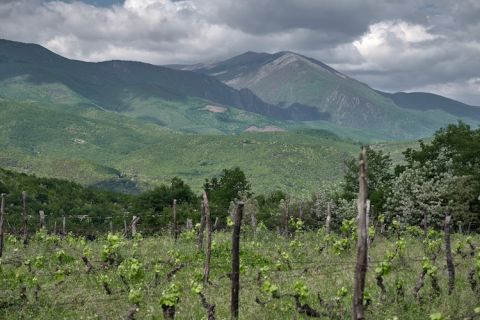From €11.40, £13.50, 21 Swiss francs, $29.99, NZ$40
This orangey-gold rosé tasted even better this week than it did late last year, when I first tasted it with winegrower Apostolos Thymiopoulos in London just after it had been released. It is also extremely good value for a wine of this depth of flavour that shows the dexterity and sensitivity of the winemaker.
As I wrote in my more recent tasting note, it seems just as aromatic as it did nine months ago, with masses of tangy red fruits and those orange-skinned Victoria plums that my mother used for jam-making because they are not as sweet as the black ones, plus a hint of apricots. It’s dry, full-flavoured, very slightly spicy and extremely fresh at the same time, and its definite but subtle tannins give the wine structure and shape, enhancing its predisposition as a wine for food. Don’t be put off by the mention of tannins, they are brilliantly judged so that the wine is complex, long and yet totally refreshing. While it is nothing like a feather-light, wan rosé, neither is it an orange wine.
Xinomavro (pronounced ksee – no – mav – ro, with the stress on the second syllable) is perhaps Greece’s most famous red grape variety, known for its strong tannins and high acidity, often pale colour and its potential for some of the finest, most elegant, complex and ageworthy wines the country can offer. It is not always easy to ripen and has to be well managed in the vineyard or the wines can be tough and acidic.
Thymiopoulos is a master of the variety and with his red wines such as the Jeunes Vignes and Earth and Sky he has probably convinced more people of Xinomavro’s greatness and versatility than many other producers. As he told me last year, a rosé can be more difficult to get right than a red. He does both.
While the Thymiopoulos family have been growing grapes on the slopes of Mt Vermio in northern Greece for several generations (see Jancis’s 2018 article Acroterra and Thymiopoulos), it was Apostolos who set up the winery in 2003. Like others of his generation in Greece, he has led a family grape-growing business into a new era of exciting bottled wines, at the same time expanding the family holdings from 4 ha to 42 ha (104 acres), as well as working with the owners of a further 120 ha. All these vineyards are certified organic.
Although this rosé is labelled PGI Macedonia, the fruit comes from the younger vines in their vineyards in Fytia within the Naoussa appellation, planted at 400–650 m (1,312–2,133 ft) on granite and schist soils. According to Thymiopoulos, Fytia ‘yields the most elegant expression of Xinomavro in the region’.
The elevation – and consequent swing between day and night temperatures – means the fruit can be harvested relatively late (early October) but with plenty of freshness and without overly high alcohol; this wine is 12.5%. While some producers make rosés from grapes that did not make the cut for a red wine, or from juice that was ‘bled’ from red grapes to concentrate a red wine, Thymiopoulos grows and picks the fruit specifically for rosé, and it tends to come from the same vineyards every year.
He leaves the juice on the skins for about 12 hours to extract a modest amount of colour and tannins, then ferments it with ambient yeasts in stainless-steel tanks. It does not go through malolactic conversion, reinforcing the freshness. It is aged on the lees for four months in second-use 500-litre barrels, which brings complexity and roundness without oak flavour.
I’d normally be a bit circumspect about the length of time you can keep a rosé in the bottle but having tasted the extraordinary 2013 vintage last year, and reading Jancis’s notes on the 2013 and other examples of mature rosé wines, I have little doubt this will age well in bottle for at least five years, if you can store it at a cool, stable temperature. Unusually, the wine is bottled in brown glass so is better protected from the light than most rosés bottled in clear glass to show off the pretty colour. As Thymiopoulos explained, ‘for me rosé is wine not a marketing product’.
Thymiopoulos’s UK importer is Eclectic Wines, and the 2021 vintage is available from The Wine Society. In the US, the wine is available in many states through Athenee Importers; contact info@atheneeimporters.com for more information. It is also available in Greece, Germany, Spain, France, Switzerland and New Zealand.
The 2022 vintage is also available in some markets, for example from Theatre of Wine in London and Wine & Greene in Totnes, Devon, as well as from Vinmonopolet in Norway. I haven’t had the chance to taste it yet but according to Thymiopoulos, 2022 was, like 2021, a cool vintage, and the wines are stylistically quite similar even if the 2021 had an extra two months on the lees. I have no hesitation in recommending this more recent vintage though I imagine it will only improve with a little longer in the bottle.
You can find many more reviews of Thymiopoulos wines, of all colours, in our tasting-notes database.

















